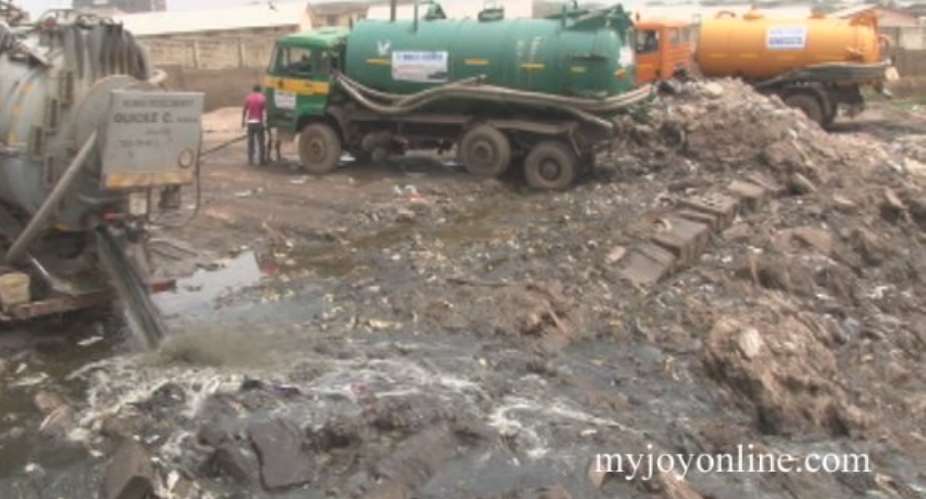The famous Lavender Hill at Korle Gonno in Accra will soon be closed down but in its place are two new liquid waste treatment plants that will produce clean water, compost for manure and up to 7.5 Megawatts of power in the long term.
The two new plants, estimated at $65 million, are the Lavender Hill Faecal Treatment Plant and the Mudor Waste Water Treatment Plant built under a public-private partnership arrangement between government and Zoomlion Ghana Limited.
The famous Lavender Hill got its name from the stench that emanates from that side of the coast because of the daily dumping of loads of liquid waste into the sea for more than a hundred years now.
At least 180 truckloads of liquid waste are poured into the sea at that spot on daily basis, and city authorities collect fees for the dumping while residents and visitors to the area endure the stench.
But the two new plants, due to be commissioned by President John Mahama on Friday, would mean all the trucks would now have to send the liquid waste to the faecal treatment plant, while various sewage systems in parts of the city will pump liquid waste directly into the waste water plant for treatment.
The Chief Executive Officer of the Jospong and Zoomlion Groups of Companies, Dr. Joseph Siaw Agyepong told Adom News the first phase of the plant will generate one megawatt of power, which will be consumed by the two plants and relieve the national grid of some load.
He said the second phase will then generate an additional 7.5 megawatts of power to be distributed to Korle Bu and other communities close to the plants.
Dr. Agyepong said besides the power, the plants will also produce clean water and pump it into the nearby lagoon so that it can be used for recreational purposes, adding however that the water would also be clean enough for domestic use.
He said the plants would also generate biogas and compost that can be used for bio-charcoal or manure for farms across the country and other West African countries.
"We also designed this plant to be used as a training facility for university and other tertiary institutions students who are interested in environmental science and waste management studies," he said.
Dr. Agyepong was full of gratitude to the President, Local Government Minister, Collins Dauda, and Accra Mayor, Dr. Alfred Oko Vanderpuije, for embracing the project, which promises to provide loads of employment to both skilled and unskilled labour and also make Ghana a waste management hub in the sub-region.





 Dumsor: Mathew Opoku Prempeh has been disrespectful, he should be fired – IES
Dumsor: Mathew Opoku Prempeh has been disrespectful, he should be fired – IES
 NPP prioritizing politics over power crisis solution — PR Strategist
NPP prioritizing politics over power crisis solution — PR Strategist
 E/R: Gory accidents kills 3 persons at Aseseaso, several others critically injur...
E/R: Gory accidents kills 3 persons at Aseseaso, several others critically injur...
 Nobody can come up with 'dumsor' timetable except Energy Minister – Osafo-Maafo
Nobody can come up with 'dumsor' timetable except Energy Minister – Osafo-Maafo
 Dumsor: You ‘the men’ find it difficult to draw timetable when ‘incompetent’ NDC...
Dumsor: You ‘the men’ find it difficult to draw timetable when ‘incompetent’ NDC...
 We’re working to restore supply after heavy rains caused outages in parts of Gre...
We’re working to restore supply after heavy rains caused outages in parts of Gre...
 NPP government plans to expand rail network to every region — Peter Amewu
NPP government plans to expand rail network to every region — Peter Amewu
 Dumsor must stop vigil part 2: We’ll choose how we demonstrate and who to partne...
Dumsor must stop vigil part 2: We’ll choose how we demonstrate and who to partne...
 2024 elections: NDC stands on the side of morality, truth; NPP isn't an option —...
2024 elections: NDC stands on the side of morality, truth; NPP isn't an option —...
 Akufo-Addo has moved Ghana from 'Beyond Aid' to ‘Beyond Borrowing’ — Haruna Idri...
Akufo-Addo has moved Ghana from 'Beyond Aid' to ‘Beyond Borrowing’ — Haruna Idri...
